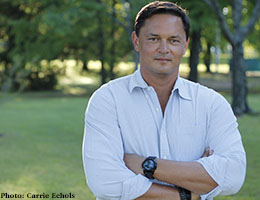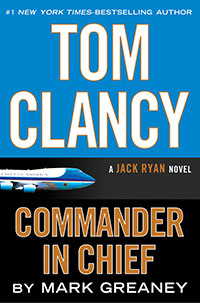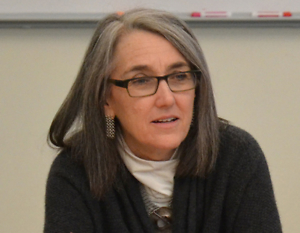Undersea, Undercover, Under Attack
In Mark Greaney’s new Tom Clancy novel, a Putinesque strong man aims to capture former Soviet lands
Memphis author Mark Greaney first garnered attention for his Gray Man thrillers—the newest book in the series, Back Blast, will be published in February—but he entered the bestselling stratosphere when Tom Clancy tapped him as a co-author on the Jack Ryan series. Since the legendary author’s death in 2013, Greaney has continued the franchise as a solo act. Prior to signing the latest installment, Tom Clancy Commander in Chief, Greaney sat for a studio interview in Memphis with Chapter 16. An excerpt of the interview, along with the full video, appears below; click here to download the full podcast or to listen online.
 Chapter 16: Commander in Chief seems to have come almost full circle from The Hunt For Red October, with a technologically advanced Soviet/Russian submarine making its way toward America.
Chapter 16: Commander in Chief seems to have come almost full circle from The Hunt For Red October, with a technologically advanced Soviet/Russian submarine making its way toward America.
Mark Greaney: And that was the third rail I didn’t want to touch for a long time. This is my sixth book either with Tom or since he passed away, and I joked with my editor, “I will do Delta Force, Marine Corps, any type of aviation, but I am not going on to a submarine for any of the books I write!” And here I am, [in only] the third one since Tom passed.
Chapter 16: Was that a fear of submarines, or a fear of handling that iconic thing?
Greaney: Tom did it so well; it just didn’t need to be redone, especially by a follow-on author, but the advances in submarines and anti-submarine warfare over the past few years just made it really interesting. I framed it as, “OK, you’re not going down into the submarine like Tom did. This is anti-submarine warfare, and they are the sharks in the water. The Americans have to go find them.” That way I stayed up on an Arleigh Burke-class destroyer [in the story], and it helped me mentally tackle this project.
Chapter 16: I’m sure the name Tom Clancy helps open a lot of doors when it comes to that kind of research.
 Greaney: Funny you should say that. I got a letter from the Secretary of the Navy, Ray Mabus, a little while after the last book, Full Force and Effect, came out. He said he enjoyed the book and that if I ever needed anything, just give them a call. I was sending emails pretty quickly saying, “Thanks, and when can I get on a ship for the next book?” So in July I went to San Diego and got on the USS Sampson, a destroyer, and spent a day with anti-submarine warfare officers. Learned a ton for the book.
Greaney: Funny you should say that. I got a letter from the Secretary of the Navy, Ray Mabus, a little while after the last book, Full Force and Effect, came out. He said he enjoyed the book and that if I ever needed anything, just give them a call. I was sending emails pretty quickly saying, “Thanks, and when can I get on a ship for the next book?” So in July I went to San Diego and got on the USS Sampson, a destroyer, and spent a day with anti-submarine warfare officers. Learned a ton for the book.
Chapter 16: So how do you go about keeping Clancy’s characters consistent in their psychology, but evolving them as human beings?
Greaney: There are a lot of characters, and Tom created these individual personalities. And just as a big fan of Tom Clancy, well before I was involved with him, I’d read all the books. There were a lot of aspects of working on a Tom Clancy book that seemed really daunting, but I felt like I knew the characters really well. There have been deaths of some of the loved ones of characters. They’ve seen a lot, and their own personal belief systems have been challenged.
Chapter 16: The antagonist in Commander in Chief is the President of Russia, Valeri Volodin. And there’s a practical equivalent to the old Soviet Politburo, but they are far from being communists.
Greaney: Two books ago was Tom’s last, Command Authority, which we co-authored. In it we introduced Valeri Volodin. He’s very Putin-esque. But we left him in play at the end because we thought there was more story we could get out of this character and contemporary Russia. It’s not communism over there; it’s a kleptocracy. And Valeri Volodin has interests in retaking some territory. It feels to a lot of people that it’s like the bad old days of the Cold War, but the ideology is different.
Chapter 16: I have to admit that since the Cold War ended I haven’t paid too much attention to the boundaries of the Soviet Union, but Russia’s Kaliningrad province plays a huge role in the plot of Commander in Chief.
Greaney: To put it briefly, the land mass of greater Russia is separated from one its provinces. Kaliningrad is on the Baltic but bordered by Lithuania and Poland, two NATO members, and then through Belarus, which is a Russian puppet state, before you get to Russia. The Russians have agreements with Lithuania to create kind of a land bridge to their own territory, but Vladimir Putin in real life, and Valeri Volodin in the book, are both threatening to make that land bridge less of an agreement on paper and more of a fact on the ground by moving troops into Lithuania.

Stephen Usery is the producer of Book Talk, an author-interview program that airs daily on WYPL FM 89.3 and is sponsored by the Memphis Public Library. Usery also produces Mysterypod, an independent podcast focused on mysteries, thrillers, and crime novels. He lives in Memphis.





